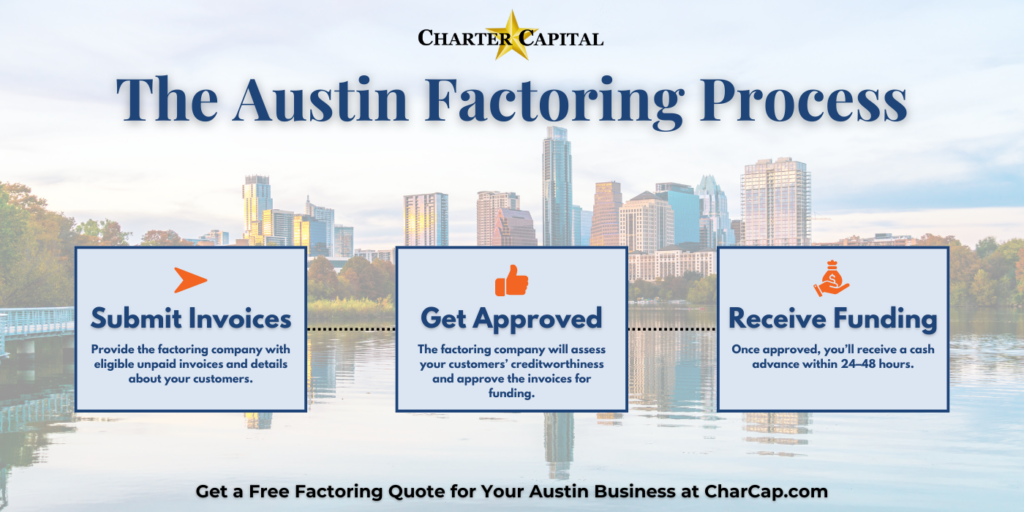Are you looking for a factoring company in Austin to help you boost your cash flow? Charter Capital’s invoice factoring team can help. Due to its robust regional infrastructure and outstanding talent pool, Austin has gained recognition as one of the top destinations for corporate headquarters and supporting facilities.
Industries in Austin That Use Accounts Receivable Factoring

As a leading Austin invoice factoring company, Charter Capital has experience in just about every commercial industry. Some of the sectors in Austin that use the services of an accounts receivable factoring company include:
- Advanced manufacturing
- Clean technology
- Corporate HQs and regional offices
- Creative and digital media technology
- Data management
- Financial service and insurance
- Biotechnology
- Space technology
Invoice Factoring Process
The global economic landscape is constantly changing. Invoice financing is a flexible and simple alternative financing solution for businesses to attain working capital without borrowing money from a traditional lender (e.g., a bank loan). When your cash flow is being negatively affected by slow-paying customers or unpaid customer invoices, a receivables factoring company can purchase outstanding invoices from your business for a percentage of the total invoice value to help you regain cash flow. Once the accounts receivable factoring company has collected payment from all of your customers, they will reimburse you the remaining percentage of the invoice value minus a small factoring fee.
It’s as easy as 1-2-3:
- Invoice your customers as you normally would.
- Submit the unpaid invoices to an invoice factoring company.
- Get your money advanced – usually on the same day.

Business Growth in Austin with Top Factoring Services
In Austin, Texas, where innovation meets tradition, businesses constantly seek efficient financial solutions to propel their growth. Factoring services stand out as a key tool for financial agility, particularly for small to medium-sized enterprises (SMEs) looking to navigate the complexities of cash flow management without the constraints of traditional banking. Austin’s factoring companies offer a range of invoice factoring services designed to address the unique needs of businesses across various industries.
Factoring companies in Austin specialize in turning invoices into immediate cash and
provide suitable factoring programs, including accounts receivable financing and purchase order financing. This ensures that businesses can access the capital they need to grow, fulfill orders, and manage payment terms effectively. With the support of the best Austin factoring services, companies can enjoy same-day funding solutions, which are particularly beneficial for industries that experience rapid turnover or extended payment cycles. The presence of these factoring services in the heart of Texas amplifies Austin’s reputation as an important center for financial innovation and support for businesses of all sizes.
Whether you are a high-tech company, a creative agency, or part of the clean energy sector, finding the right factoring company in Austin can provide the financial flexibility you need to sustain and grow. These companies understand the local business landscape, offering a complete line of invoice factoring services that cater to the wide range of industries thriving within Austin’s city limits. By choosing a factoring company that offers specialized and comprehensive services, Austin businesses can maintain their operational efficiencies and contribute to the city’s economic diversity.
About Austin
Austin is the capital of the State of Texas and the 11th largest city in the U.S., and its metropolitan area has a population of over 2.2 million.
The affordable cost of living in Austin is below the national average and significantly lower than in many major markets. There is no personal state income tax, contributing to a state and local tax burden that is 18% lower than the national average.
Climate
The climate is characterized by long, hot summers and short, mild winters. Spring and fall are warm transitional periods. Rainfall is evenly distributed throughout the year, with the heaviest downfalls occurring in May, June, and October, respectively.
History
Initially, the nomadic tribes of Tonkawas, Comanches, and Lipan Apaches lived along the creeks at the bend of the Colorado River.
Spanish missions were set up in the area in the late 1700s, while the 1830s saw the arrival of the first Anglo settlers who named their hamlet Waterloo. In 1839, the village was selected as the permanent capital of the Republic of Texas and renamed in honor of Stephen F. Austin, father of the Republic of Texas.
When the 1842 Mexican invasion threatened Texas, the government moved to Houston. Austin residents staged the Archive War, forcibly keeping government records to retain Austin as the capital. Texas was admitted to the United States in 1845, and the government returned to Austin.
Austin thrived as a trading center thanks to the Houston and Texas Central Railroad and the 1871 construction of a proper bridge across the Colorado River. The Great Granite Dam on the Colorado River in 1893 boosted the economy by providing hydraulic power to generate electricity.
Economy
Austin has established a diverse, creative, and innovative environment that contributes to a unique way of life. The thriving economy has drawn entrepreneurs, startups, growing companies, and tech giants.
As a major high-tech center, the Austin region (nicknamed Silicon Hills in the 1990s) is home to the headquarters of many technology corporations. With thousands of students graduating from the engineering and computer science programs at the University of Texas at Austin, the city boasts a concentration of highly educated millennials – earning it the epithet of the “Human Capital.”.
The technology sector is innovating manufacturing, especially clean energy, such as wind turbine manufacturers, system integrators, and solar companies. It is a perfect environment for life sciences companies, creative and digital media, data management businesses, and space-based enterprises.
Recent successes like Charles Schwab, Dimensional Fund Advisors, and PIMCO have bolstered Austin’s appeal in the financial services industry. Over the years, Austin’s appeal as a city to work and live has attracted companies looking to establish corporate and regional headquarters. Examples include Apple, Dell, eBay, National Instruments, and Whole Foods.
Business Resources
The Austin Chamber is a membership organization that helps create jobs so people can find work and provide for their families. Members are local businesses that are invested in developing their businesses, growing our economy, and strengthening our community.
The Austin Independent Business Alliance promotes locally-owned businesses and provides marketing, educational, and networking opportunities.
The Small Business Development Program, sponsored by the Austin city government, provides information and support to those starting, running, or expanding a small business, such as a restaurant or shop.
For over 25 years, BiGAUSTIN has focused on small business and workforce development to build healthy, sustainable communities.
The Small Business Development program provides counseling and development assistance to Austin’s small business owners.
Call us toll-free at 1-855-751-7937 or contact us today to learn how easy it is to set up a Charter Capital Receivables Funding Line. One of our account representatives will be happy to assist you.

